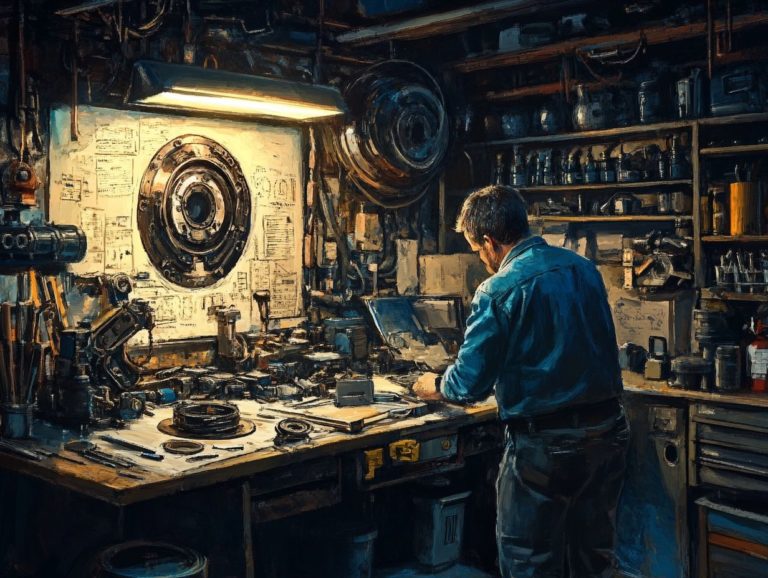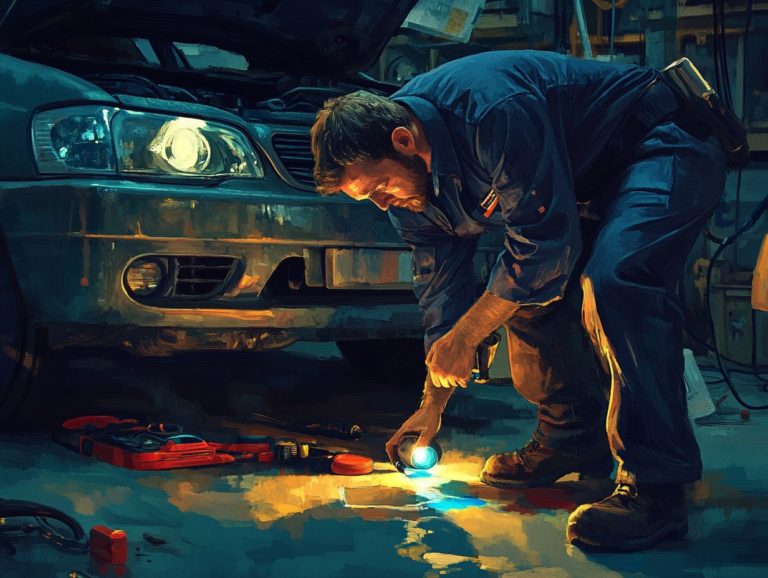5 Common Repairs for Hybrid Vehicles
Hybrid vehicles present a sustainable alternative to traditional cars, but they also come with unique challenges.
As a hybrid owner, you should be aware of potential issues like battery replacements and electric motor troubles. Being informed about common repairs is crucial for maintaining your vehicle s performance.
This article delves into five frequent problems that hybrid vehicles encounter, the telltale signs that indicate your car may need attention, and how regular maintenance can ultimately save you both time and money.
We ll also examine whether hybrid repairs tend to be pricier than those for standard vehicles and provide some DIY tips to ensure your hybrid runs seamlessly.
Immerse yourself in this guide to learn how to keep your eco-friendly ride in peak condition!
Contents
- Key Takeaways:
- 1. Replacing the Hybrid Battery
- 2. Repairing the Electric Motor
- 3. Fixing the Regenerative Braking System
- Conclusion
- 4. Replacing the Inverter
- 5. Repairing the Hybrid Transmission
- What Are the Most Common Hybrid Vehicle Problems?
- Frequently Asked Questions
- What Are the Most Common Repairs for Hybrid Vehicles?
- How Often Do Hybrid Vehicles Require Battery Replacements?
- What Issues Can Arise with a Hybrid Vehicle’s Brake System?
- When Should the Inverter of a Hybrid Vehicle Be Replaced?
- What Types of Repairs Are Involved with a Hybrid Vehicle’s Cooling System?
- How Common Are Transmission Repairs for Hybrid Vehicles?
Key Takeaways:
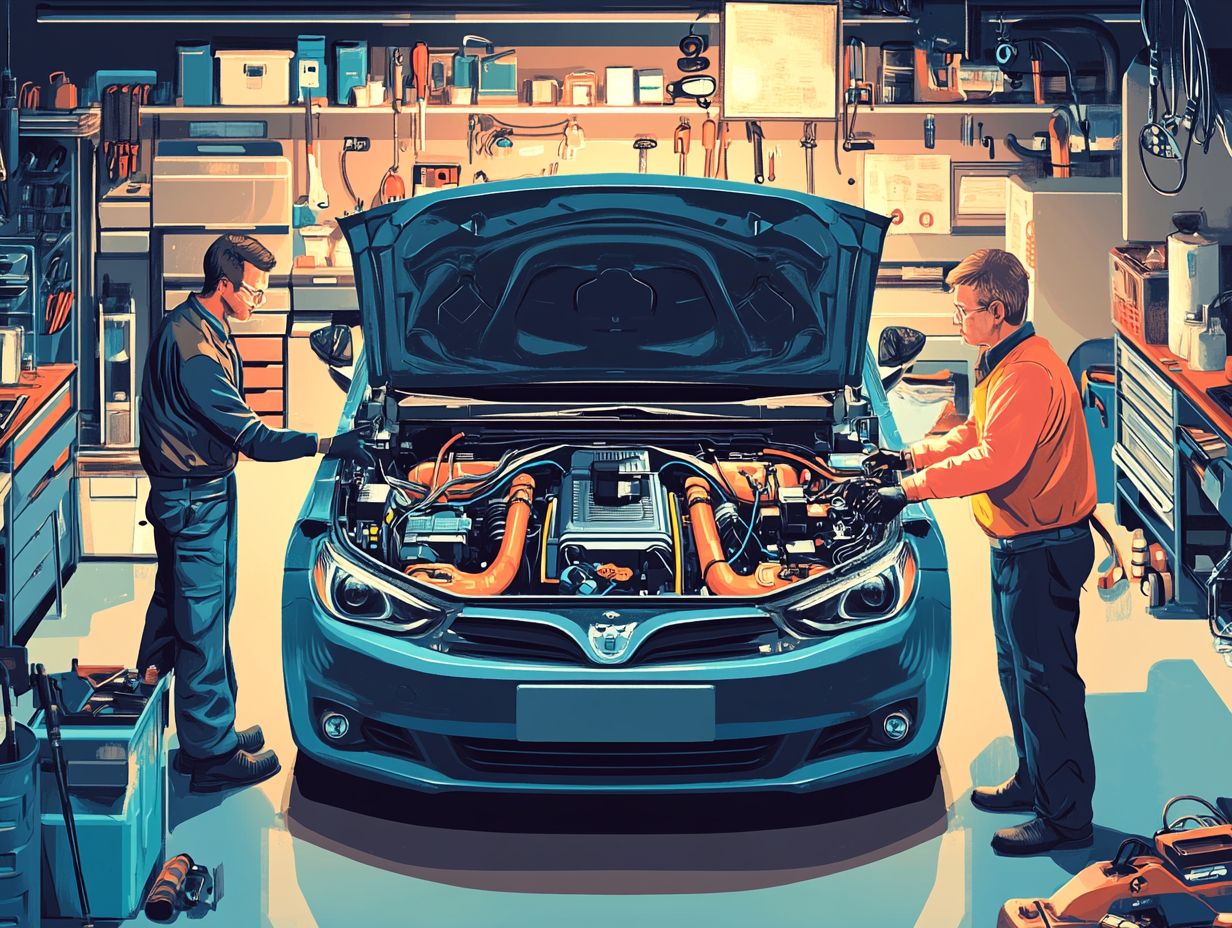
- Regular maintenance is crucial for preventing common repairs in hybrid vehicles.
- Hybrid batteries, electric motors, and regenerative braking systems are among the most common repairs for hybrid vehicles.
- Hybrid vehicles offer benefits such as improved fuel efficiency and lower emissions, but may be more expensive to repair compared to traditional vehicles.
1. Replacing the Hybrid Battery
Replacing the hybrid battery is a vital maintenance task for hybrid cars. Battery degradation can greatly affect your vehicle’s performance, driving range, and overall fuel efficiency.
For eco-friendly transportation enthusiasts, addressing this issue promptly is essential to avoid more significant repair costs in the future. Recognizing the signs of battery degradation is crucial.
You might notice a sudden drop in fuel efficiency, longer charging times, or warning lights illuminating your dashboard. Regular maintenance routines can help you maintain battery health, minimizing the risk of premature failure.
Ignoring these issues could lead to costly repairs and replacements that may strain your finances. To extend the life of your battery, consider these strategies:
- Keep your vehicle in moderate temperatures.
- Avoid excessive discharging.
- Perform timely inspections.
Simple habits, like charging during off-peak hours and combining errands to reduce the number of trips, can also make a significant difference.
2. Repairing the Electric Motor
Repairing the electric motor in hybrid cars is essential as it directly impacts performance and driving efficiency.
Ignoring issues that arise from complex electronics can lead to costly repairs if they’re not addressed promptly. Staying proactive with inspections can enhance both the longevity and functionality of your electric motors.
Regular vehicle maintenance is your best ally in preventing these performance pitfalls, allowing you to catch potential problems before they escalate. Keep an eye out for warning signs like unusual noises, reduced acceleration, or those pesky warning lights on the dashboard.
Identifying these early can save you a significant amount on auto repairs down the line. Understanding how these components operate enables you to make informed decisions, ensuring a smoother driving experience while sidestepping unexpected breakdowns.
3. Fixing the Regenerative Braking System
Fixing the regenerative braking system is essential for maintaining optimal driving performance in your hybrid vehicle.
This system not only enhances brake efficiency but also supports eco-friendly transportation by recapturing energy during braking. This innovative mechanism cleverly transforms movement energy generated during deceleration into electrical energy, which is stored for later use.
Ultimately, this elevates your vehicle s overall efficiency. Unlike traditional braking systems that rely heavily on friction and can lead to significant wear and tear, regenerative braking dramatically reduces brake pad degradation.
If you notice signs like decreased braking efficiency or unusual noises while braking, don t ignore these signs act now! By ensuring that your modern braking system operates at its best, your hybrid vehicle can deliver a smoother ride, improved fuel economy, and a smaller carbon footprint making it a wise choice for environmentally conscious drivers like you.
Start maintaining your hybrid today to save on future repairs!
Conclusion
In summary, regular maintenance is vital for addressing common issues in hybrid vehicles. Being proactive not only enhances performance but also saves you money in the long run. Keep an eye on your vehicle’s health to enjoy the many benefits of hybrid technology.
4. Replacing the Inverter
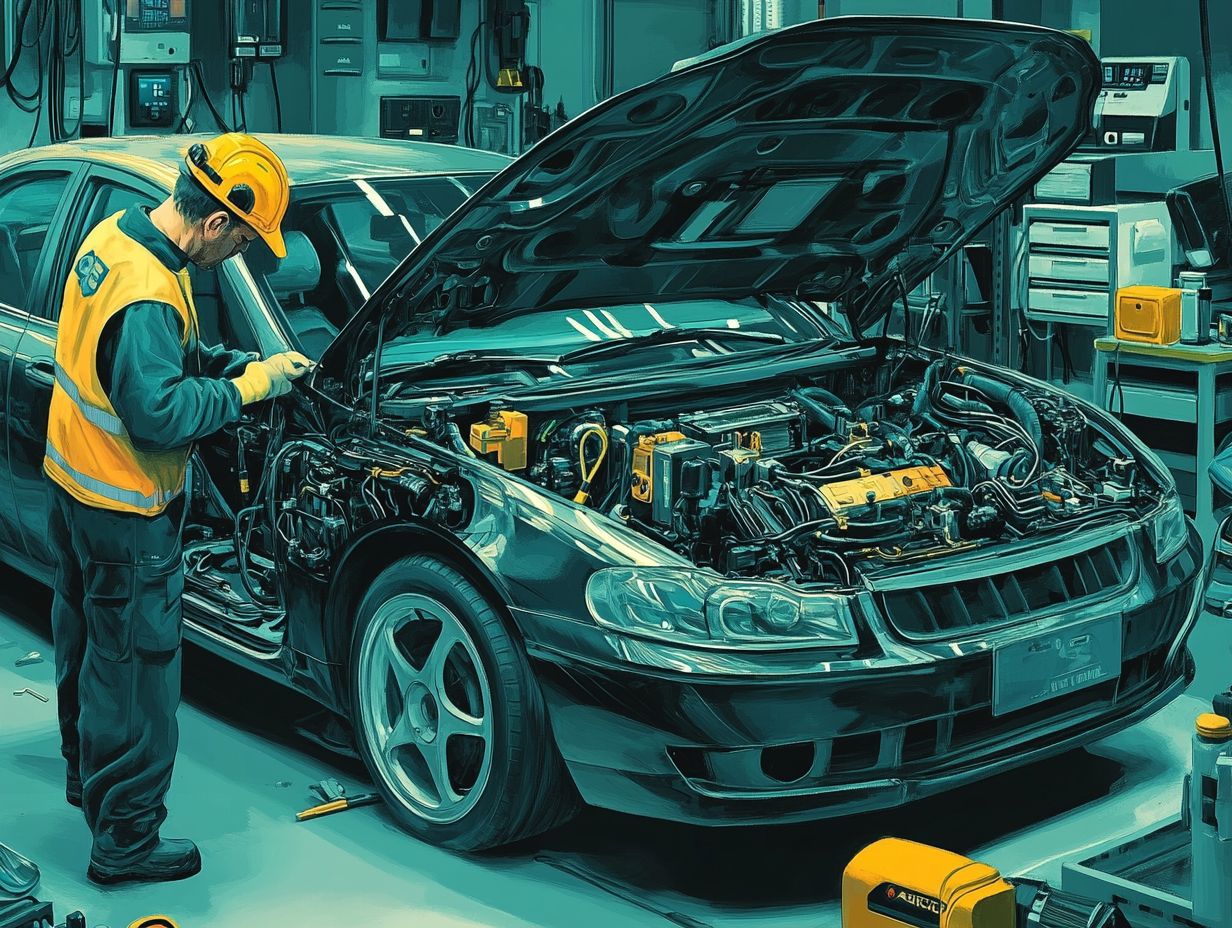
Replacing the inverter in a hybrid system is vital. It can resolve major performance issues, such as transmission failure, ensuring your vehicle runs smoothly and efficiently.
The inverter converts direct current (DC) from your vehicle’s battery into alternating current (AC) to power the electric motor. If you notice unusual noises or warning lights on your dashboard, or if performance dips, these could be early indicators of inverter failure.
Repair options vary from simple component replacements to full unit swaps, depending on how severe the issue is. Ignoring these warning signs is risky and can lead to escalating repair costs.
Further damage to the electrical system or hybrid components may occur, ultimately jeopardizing your vehicle s overall reliability and efficiency.
5. Repairing the Hybrid Transmission
Repairing the hybrid transmission is essential for optimal vehicle performance. Issues can lead to increased fuel consumption and raise safety concerns due to the reliance on sophisticated electronics.
Symptoms like erratic shifting, unusual noises, or warning lights on your dashboard indicate your hybrid transmission may need professional attention. Don’t wait! Address these issues promptly to ensure your safety and your vehicle’s efficiency.
A malfunctioning transmission impacts performance and compromises vehicle safety, increasing the risk of accidents and breakdowns.
What Are the Most Common Hybrid Vehicle Problems?
Hybrid vehicles face common challenges that can impact performance. Issues may include battery health concerns, electric motor performance hiccups, and transmission failures.
These problems can reduce efficiency and increase maintenance costs. You might notice a dip in fuel efficiency, sluggish acceleration, or warning lights flickering on your dashboard.
If the battery loses charge capacity, expect a significant drop in fuel economy.
If the electric motor isn t performing well, your vehicle may struggle to accelerate, dampening its overall power and responsiveness.
To tackle these challenges, invest in regular maintenance checks. Monitor battery health and address any warning signals proactively to keep your vehicle in peak condition.
What Are the Signs That a Hybrid Vehicle Needs Repairs?
Identifying signs that your hybrid vehicle needs repairs is crucial for longevity and optimal performance. Look for indicators like unusual sensor readings and decreased driving efficiency.
Monitor fuel efficiency closely; a noticeable drop signals underlying problems. Be alert for unusual sounds or vibrations while driving, as these hint at mechanical issues needing immediate care.
Keep an eye on dashboard warning lights; if any illuminate unexpectedly, they may indicate maintenance needs. By recognizing these signs early, you can save yourself from costly repairs and ensure your hybrid runs smoothly.
Are you noticing any of these signs in your hybrid vehicle? If so, consult a professional immediately.
How Can Regular Maintenance Help Prevent These Repairs?
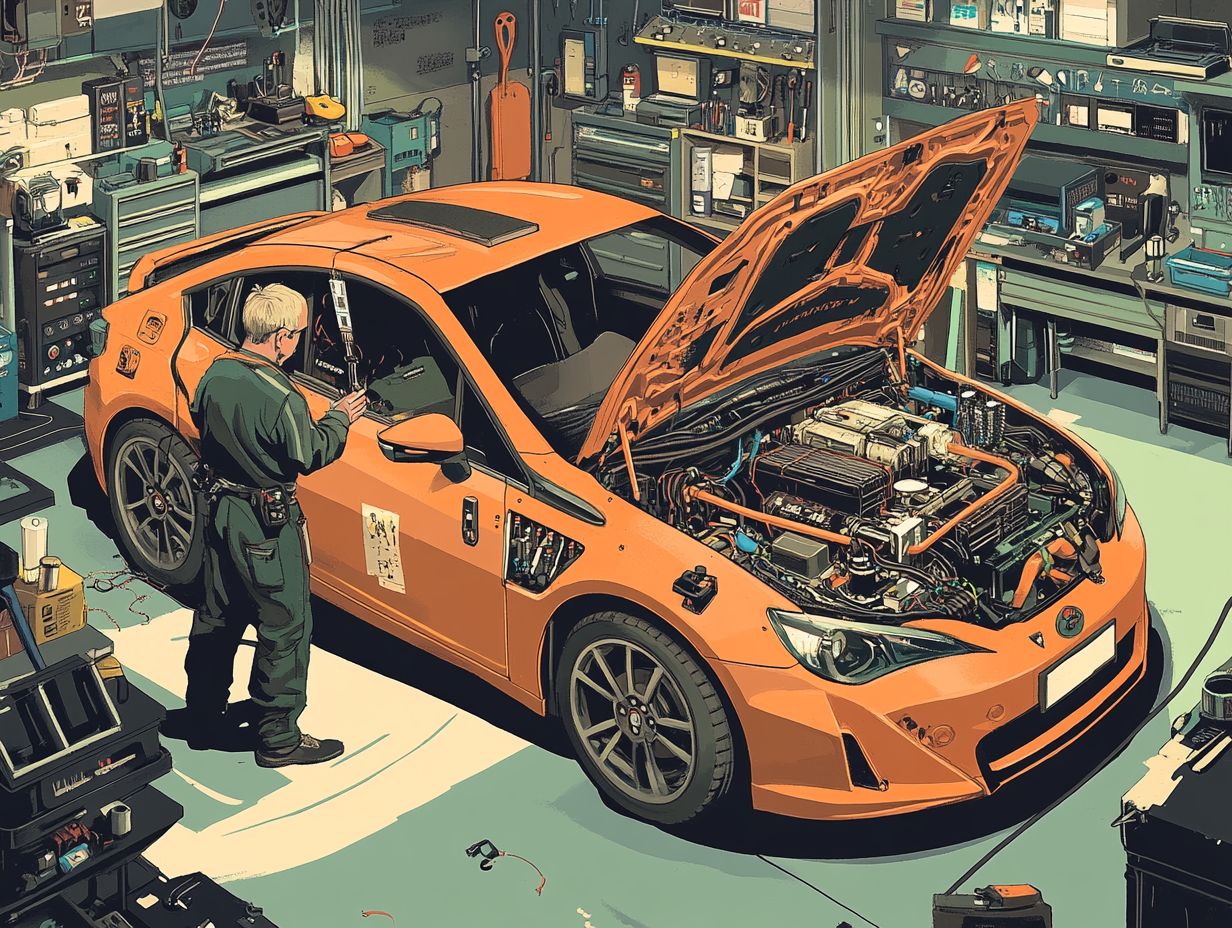
Regular maintenance helps you avoid repairs for hybrid vehicles. It helps you maintain battery health and improve how your car handles, ultimately reducing repair costs over time.
By sticking to a scheduled maintenance routine, you can catch early signs of potential issues before they snowball into expensive repairs. This approach ensures that key parts work well and last longer, allowing you to drive with peace of mind.
Regular checks enable you to make adjustments and replacements that might be easy to overlook, ensuring your vehicle remains in peak condition.
Neglecting maintenance decreases performance and increases the likelihood of unexpected breakdowns. This highlights the importance of a regular maintenance schedule in preserving the longevity of these sophisticated vehicles.
What Are the Benefits of Owning a Hybrid Vehicle?
Owning a hybrid vehicle presents you with a wealth of benefits, including superior fuel efficiency, a reduced environmental footprint, and enhanced driving performance! This makes it an enticing choice for the eco-conscious individual.
These vehicles combine traditional gasoline engines with electric power, significantly boosting fuel economy compared to their conventional counterparts. As you consume less fuel, you’ll find substantial savings accumulating over time, freeing up more of your hard-earned money for other pursuits.
The lower emissions generated by hybrid vehicles play a vital role in promoting cleaner air, tackling one of the most pressing issues related to air pollution, and contributing to a healthier planet for all.
Many hybrid models are equipped with cutting-edge technology that enhances performance while minimizing fuel consumption. Imagine cruising down the road while being kinder to the planet!
Are Hybrid Vehicles More Expensive to Repair Than Traditional Vehicles?
You might wonder if hybrid vehicles come with pricier repair costs compared to traditional ones. Some repairs for hybrids can be pricey, but others can save you money, depending on the specific maintenance issues at hand.
The complexity of components in hybrids, such as the battery and electric motor systems, often results in higher repair bills for particular problems. On the other hand, traditional vehicles might demand more frequent routine maintenance and lead to costly repairs tied to their combustion engines.
A prominent automotive research group found that the average repair cost for hybrids tends to be about 10-20% higher than for traditional vehicles. However, many hybrid owners reported overall savings in maintenance due to reduced wear and tear.
Moreover, warranty claims statistics indicate that hybrid vehicles typically have fewer warranty-related repairs compared to traditional ones, suggesting they can prove to be more reliable over time.
What Are Some DIY Repairs for Hybrid Vehicles?
Performing DIY repairs on your hybrid vehicle can save you time and money. It also enables you to tackle many common repairs and maintenance tasks without professional help, especially if you follow the right routine maintenance for hybrid cars guidelines.
By deepening your understanding of these vehicles, you can confidently handle everything from changing the oil to replacing brake pads. This approach cuts unnecessary expenses and avoids long waits at the mechanic s shop.
Having the right tools is essential. You ll typically need a socket set, wrench set, jack stands, and a multimeter for checking electrical systems.
For example, when it s time to change the oil, start by safely lifting your vehicle with a jack. Then, remove the drain plug to let the old oil flow out completely. After that, replace the oil filter before adding the fresh oil.
Always prioritize safety to ensure a smooth and effective DIY experience. Unplug the battery during electrical repairs and wear gloves, as these precautions are critical. Understanding your vehicle’s hybrid system will help you perform these repairs and recognize when it s time to call in a professional.
Frequently Asked Questions
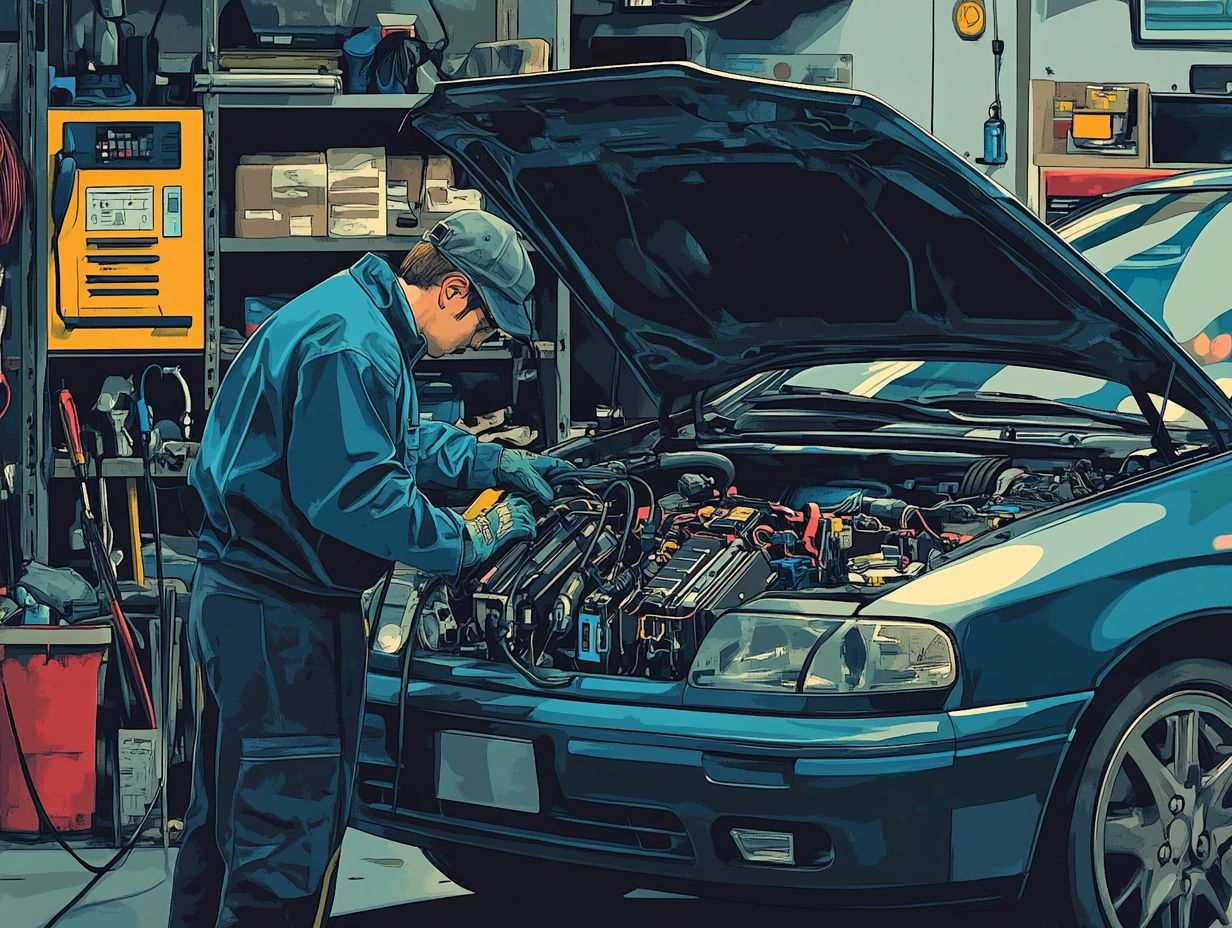
What Are the Most Common Repairs for Hybrid Vehicles?
The most common repairs for hybrid vehicles include battery replacements, brake system repairs, inverter replacement, cooling system repairs, and 5 common repairs for luxury vehicles.
How Often Do Hybrid Vehicles Require Battery Replacements?
The lifespan of a hybrid vehicle’s battery varies. On average, it may need replacement after 8-10 years or 100,000 miles.
What Issues Can Arise with a Hybrid Vehicle’s Brake System?
Common issues with hybrid vehicle brake systems include worn brake pads, damaged rotors, and malfunctioning regenerative braking systems.
When Should the Inverter of a Hybrid Vehicle Be Replaced?
The inverter of a hybrid vehicle may need replacement if it fails or malfunctions, which can happen after 100,000 miles or more.
What Types of Repairs Are Involved with a Hybrid Vehicle’s Cooling System?
The cooling system of a hybrid vehicle may require repairs such as replacing coolant, fixing leaks, or repairing the electric water pump.
How Common Are Transmission Repairs for Hybrid Vehicles?
Transmission repairs for hybrid vehicles are less common than for traditional gas-powered cars. However, they may still be necessary due to wear and tear or electrical issues.


